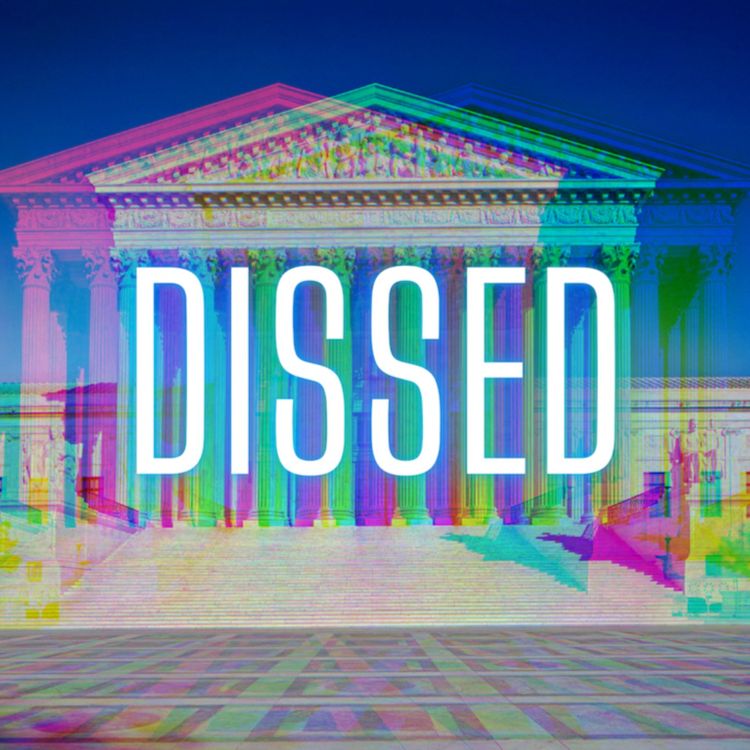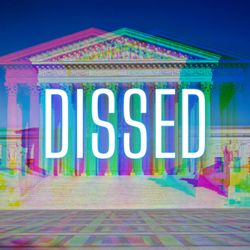Share

Dissed
Will the Real Tone Dougie Please Stand Down
Season 4, Ep. 3
•
This is the story of Tone Dougie, an aspiring rapper who posted rap lyrics on Facebook about killing his estranged wife and blowing up an FBI agent. Tone Dougie says he didn't intend to threaten anyone and was simply inspired by Eminem. But the federal government saw things differently and prosecuted him for making “true threats.” His case eventually reached the Supreme Court, where only one justice dissented. Were Tone Dougie’s posts protected speech or criminal threats? Tune in to find out!
Thanks to our guests Adam Liptak and John Elwood. Special thanks to our longtime editor John Carter for his rap portrayal of Tone Dougie.
Follow us on Twitter @ehslattery @anastasia_esq @pacificlegal #DissedPod
More episodes
View all episodes

8. Lady Justice Isn’t Blind
46:27||Season 5, Ep. 8Lady Justice is often depicted wearing a blindfold, signifying that judges are neutral arbiters of the law. Unfortunately, thanks for a judicial doctrine known as Chevron deference, the Supreme Court has required judges to peek from behind that metaphorical blindfold and put a thumb on the scale for the most powerful litigant in our nation: the federal government. In a case called Brand X, the Court took Chevron deference to its logical conclusion, allowing agencies to overrule judicial decisions. One dissenter wrote that this was not only bizarre, but it was probably unconstitutional. That view has been picking up steam in the past decade. Next term, the Court will hear a case asking it to overturn Chevron deference.Thanks for our guests Aditya Bamzai and Jeff Wall.Follow us on Twitter @ehslattery @anastasia_esq @pacificlegal #DissedPod
7. A Ripsnorting Dissent
40:12||Season 5, Ep. 7The government’s deprivation of life, liberty, or property is legitimate only if preceded by certain procedural protections—better known as due process of law. This includes reasonable notice of the rules so citizens can know and follow them. But a 1947 Supreme Court decision gave the burgeoning administrative state the ability to create new rules with retroactive application, through a process known as adjudication. A dissent by Justice Robert Jackson—who was no enemy of the administrative state—lambasted the Court for failing to scrutinize this action. Thanks to our guests John Barrett and Joe Postell. Follow us on Twitter @ehslattery @anastasia_esq @pacificlegal #DissedPod
6. The Buck Stops with the President
38:00||Season 5, Ep. 6The federal government is brimming with hundreds of agencies and millions of employees, many of whom enjoy some independence from political accountability. But the President is supposed to be responsible for everything that happens in his branch of the government. With the creation of more and more “independent” agencies, the lines of accountability have become blurred. In a series of cases, however, the Supreme Court has required clear lines of accountability so that the buck stops with the President. Thanks to our guests Tommy Berry and Chris Walker. Follow us on Twitter @ehslattery @anastasia_esq @pacificlegal #DissedPod
5. Delegation Running Riot at SCOTUS
38:44||Season 5, Ep. 5A central feature of our Constitution’s separation of powers is that Congress is charged with making the law, and it can’t give away this power to the other branches of government. Known as the nondelegation doctrine, this core protection of our liberty has only been halfheartedly enforced by the courts for much of the past century. In 1935, however, nondelegation enjoyed “one good year” when the Supreme Court held that Congress unconstitutionally gave away its lawmaking power. But a dissent quickly became the new majority and the nondelegation doctrine mostly vanished. In recent years, several justices have expressed an interest in reviving that old doctrine. Will the nondelegation doctrine enjoy another good year?Follow us on Twitter @ehslattery @anastasia_esq @pacificlegal #DissedPod
4. The Supreme Court and Indian Children
40:04||Season 5, Ep. 4In 1978, amid a sordid history of Native American children being taken from their families and placed in custody of non-Indians, Congress passed the Indian Child Welfare Act, or ICWA. Though passed with good intentions, critics say ICWA actually offers Indian children less protection than non-Indian children solely because of their ancestry. This term, the Supreme Court will decide Brackeen v. Haaland, which challenges the constitutionality of ICWA. But a case nearly a decade ago foreshadowed the constitutional arguments that are now before the court. Thanks to our guests Timothy Sandefur and Oliver Dunford. Follow us on Twitter @anastasia_esq @ehslattery @pacificlegal #DissedPod
3. Korematsu and the Court of History
38:22||Season 5, Ep. 3In 1944, the Supreme Court upheld the wartime internment of Japanese-Americans. It’s the first time the court applied strict scrutiny to racial discrimination by government. Over the protests of three justices, the Court held in Korematsu v. United States that the Roosevelt Administration met that exacting standard. One of the dissenters lamented, “Racial discrimination … has no justifiable part whatever in our democratic way of life.” Nearly 75 years later, the court would explain that ruling “was gravely wrong the day it was decided” and “has been overruled in the court of history.” What is Korematsu’s legacy and how is it casting an influence on the court today? Thanks to our guests John Q. Barrett and John Yoo. To learn more, check out KOREMATSU VERSUS US, a documentary short produced by the Federalist Society that explores the facts, conviction, and following cases surrounding Fred Korematsu and the other 120,000 "relocated" immigrants and citizens during World War II at https://fedsoc.org/commentary/videos/korematsu-versus-usFollow us on Twitter @ehslattery @anastasia_esq @pacificlegal #DissedPod
BONUS: Supreme Court Justice – DENIED!
16:21|In this bonus episode, the ladies tell the sad tale of John Rutledge, the first Supreme Court nominee rejected by the Senate. It’s a cautionary tale that demonstrates why justices should hold their fire for their dissents rather than political speeches.Follow us on Twitter @ehslattery @anastasia_esq @pacificlegal #DissedPod
2. Total Swine
34:36||Season 5, Ep. 2Dairy and apples and whiskey and wine. Many of our favorite things have turned in up cases involving the Commerce Clause at the Supreme Court. This term, the Court will consider whether a California law regulating the sale of pork violates that Clause. Some think the Court will strike California's pork ban down. Others wonder, based on recent dissents, whether the justices will use this opportunity to get rid of the "dormant Commerce Clause" doctrine altogether. Join the ladies as they take a romp from the 1780s to present day in search of the "dormant Commerce Clause," a phrase frequently invoked but not actually found anywhere in the Constitution.Thanks to our guests Barry Friedman, Carter Phillips, and Adi Dynar, and to Jenni Etimos for her rendition of "Free Market Favorite Things."Check out the full version of Gyu-Ho Lee's rock cover of "My Favorite Things": https://www.youtube.com/watch?v=kdRwBNkbLXsFollow us on Twitter @ehslattery @anastasia_esq @pacificlegal #DissedPod
BONUS: Who is Clarence Thomas?
21:33|Supreme Court Justice Clarence Thomas is well known for his heterodox legal views and willingness to stick to his principles. What’s less known is his incredible story. Born dirt poor in the segregated south, Thomas’s work ethic and intellect led him to Yale Law School, then to becoming Chairman of EEOC, then to nomination as federal appellate judge, and finally to confirmation as a Supreme Court Justice. According to Mark Paoletta, co-editor of a recently released book about the justice, Thomas’s life “is more stunning and amazing than just about anybody in public life as we know it.”In this mini-episode, the ladies interview Mark, who tells the not often told tale of this often talked about Supreme Court justice.Special thanks to Mark, whose book “Created Equal: Clarence Thomas in his own words” (based on the documentary of the same name) was released this year.Follow us on Twitter: @Anastasia_Esq @EHSlattery @PacificLegal